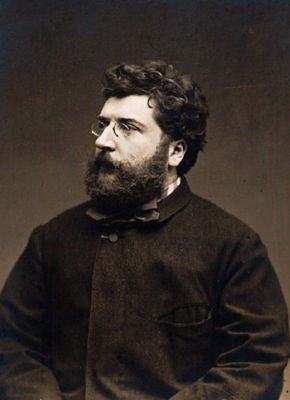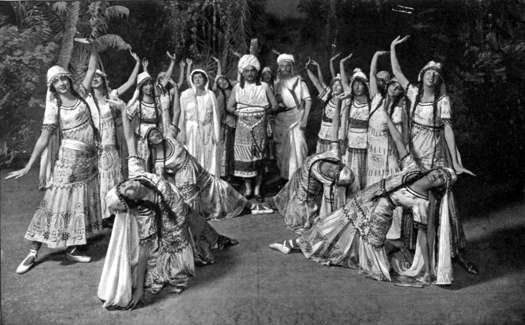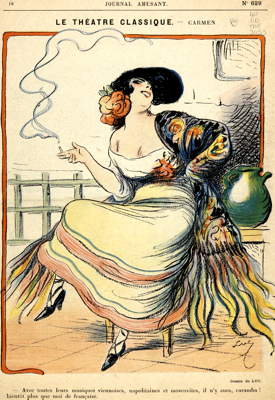- Lyrita Recorded Edition
- Gordon Crosse
- Yannis Markopoulos
- Turangalîla Symphony
- Madame Butterfly
- medieval
- National Symphony Orchestra of Chile
- University of Chicago
 DISCUSSION: What is a work? John Dante Prevedini leads a discussion about The performing artist as co-creator, including contributions from Halida Dinova, Yekaterina Lebedeva, Béla Hartmann, David Arditti and Stephen Francis Vasta.
DISCUSSION: What is a work? John Dante Prevedini leads a discussion about The performing artist as co-creator, including contributions from Halida Dinova, Yekaterina Lebedeva, Béla Hartmann, David Arditti and Stephen Francis Vasta.
 WORD SEARCH: Can you solve Allan Rae's classical music word search puzzles? We're currently publishing one per month.
WORD SEARCH: Can you solve Allan Rae's classical music word search puzzles? We're currently publishing one per month.
Tragic Expression

GEORGE COLERICK discusses Georges Bizet,
as the most vital French opera composer since Berlioz
During the thirty-third performance of the first production of Carmen, the singer playing the title role had a presentiment and fainted as she left the stage, resuming later. Her interpretation was excellent by report but that was the night in 1875 Georges Bizet died aged only thirty-seven, suffering from angina and complications. The opera's world-wide popularity makes it appear to stand alone as Bizet's masterpiece, so there is curiosity about Bizet's other stage works, especially with the scope for recording the previously unknown.

Georges Bizet in 1875 by French journalist,
caricaturist and photographer
Étienne Carjat (1828-1906)
A Parisian born to musical parents, his composing and pianistic talents were so great that it took years for him to be sure of his destined path, which was opera.
Because he had been composing for twenty years, the amount of music is considerable: including some forty songs with piano, two early operettas, two other operas which are often performed in our times, and some others which exist in manuscript. His biographer Winton Dean had studied Bizet's little known and incomplete works in great detail during the 1940s so made an expert commentary in the Master Musicians series of books.
In an apprentice competition composing for a farce, Doctor Miracle, Bizet had shared first prize with Charles Lecoq who went on to excel in operetta. His next stage work, Don Procopio, had a similar plot to Donizetti's Don Pasquale, and its music was in suitably comic spirit. He had often contributed to the musical jokes and dressing up which were a feature of soirées with his colleagues when Offenbach imitated animals on his cello. Striking evidence of this lighter touch are his Children's Games written as piano pieces, the most popular ones later orchestrated.
In his twenties Bizet had started several compositions, then partly destroyed or recycled them. Valuable material reappeared in the posthumous sixteen songs. An earlier one, The Arab Hostess' Farewell, is of special interest. Indecision came from lack of confidence, anxiety about the number and strength of influences which bore upon his style when young, such as the Germans Meyerbeer, Wagner and Weber. Nor could he decide about concentrating on symphonic or operatic writing. In the first category, Roma and Patrie clearly involved national sentiments which, like religious ones, were not Bizet's strength, and eventually he realised the musical stage was his destiny. Yet a symphony written when he was barely seventeen was not discovered until 1935. Schubertian, it is now admired more than he could ever have expected.
France's gaining territories in North Africa led to the notion that 'Oriental' music was what simply one might associate with the southern and eastern coasts of the Mediterranean. Yet it was a convenient starting point for popular understanding. In melody the pronounced sliding between close musical notes gave rise to the term arabesque, less used now. Pleasing imitation Asian melodies and rhythms would come from several French composers. Bizet did not need to travel abroad but a valuable stage in his development came through studying foreign and oriental melodic styles from travelling musicians in Paris. He took the opportunity of the 1867 International Exhibition which helped to promote new cults and fashions.
Before that, aged twenty-four he had composed a large, complex opera, The Pearl Fishers (1863), a tale of friendship and religious inhibitions. The male duet has become specially liked through the spread of broadcasting along with a romance for the tenor. A duet for the lovers and a Cavatina for the soprano also gave the work distinction. The story relates to India, most closely felt in a choral hymn to Brahma, though he might not be so pleased by a ritual dance nearer to first-class operetta. Nearly all the soloists' music sounds European and Gounod's influence was strong. The friendship theme is heard in the male duet and elsewhere, though Dean thought it not strong enough for a motif, unlike the fate theme in Carmen. He was less impressed by the ritual music and the final trio because he thought its heroic sentiments did not suit Bizet's style.

An Act II scene from the 1916 New York Metropolitan Opera production of Bizet's 'Les pêcheurs de perles' (The Pearl Fishers)
Bizet remained enthusiastic about Gounod's work and soon after the older man broke off working on Ivan the Terrible, he prepared his own score then later discarded it. Probably like Gounod, he felt the subject was not sufficiently lyrical but the work was reassembled in Germany and performed in 1946. The Fair Maid of Perth (1866) suited Bizet better, a comic opera based on Walter Scott's novel. It had a wretched libretto he was contracted to accept, though the characters are more rounded than in his earlier works. Musically there is no trace of Scotland in it, but Dean welcomes the absence of Meyerbeer's influence to be replaced by that of Rigoletto and Mireille, two operas which he says Bizet specially admired.
There are humorous episodes such as a failed seduction scene backed by music of great delicacy. The lilting serenade was composed when Bizet was nearly twenty-one. It is exceptional enough to be used several times, finally for the balcony scene of lovers' reconciliation after the feckless Maid Catherine had suffered operatic madness. An amorous gipsy woman provides the opposition, such as entering disguised into a bed intended for another. Her wild Bohemian dance is now so familiar that many assume it comes from Carmen in which it would be well worthy of a place.
There is a jealous witch who wreaks havoc in King Thule's Cup, a half-finished opera of which parts were published separately. Dean specially admired the prelude, considering the work would have shown a big advance in tragic expression. Bizet was at his best inspired by conflicts between couples where just one or both are emotionally distressed; his treatment of idyllic love is less impressive.
The following stage work had the slightest of stories; a court official plots unsuccessfully to acquire a girl from a harem. Namouna had been a slave in an 1829 Musset poem, the subject of a ballet by the French composer, Edouard Lalo. Her name was changed to Djamileh for Bizet's one-Act opera in which her master takes time to decide he desires her. Interest centres on her anxieties, and these are most sensitively expressed in Bizet's finest 'Oriental' score. Dean thought Bizet had gained maturity with it. About her dance he comments:
Djamileh's dance is rhythmically reminiscent of the Bohemian dance in The Fair Maid of Perth; it is in the same melodic variation form but the exotic colouring is much more pronounced. Its sinuous melody, half in the minor key, winding its way through combinations of voices and instruments accompanied by a syncopated rhythm, gives an effect of seductive languor ... The exotic element is never unpleasently obtrusive, never mere titillation of the ear. It is always subservient to the dramatic purpose ... The music is as fresh today as in 1872.
Bizet wrote incidental music for a dramatisation of Daudet's tragic novel, L'Arlésienne. The French term mélodrame bears no relation to our melodrama. It is music providing ambience or more for on-stage speech or action, quite different from a traditional operatic aria; composers such as Massenet and Lehár used it selectively to good effect. In L'Arlésienne he uses it to extend his dramatising skills, but the finished product was excellent. It was to be with Carmen his finest achievement in the few years left. The minimal chances of seeing L'Arlésienne as a play with music are compensated partly by two orchestral suites made from substantial extracts.
The girl from Arles never appears in the play, nor in the opera composed soon afterwards by the Italian, Francisco Cilea. Though this is intended in the original to add to her mystique, her absence is regrettable as she might have inspired Bizet further. The lover commits suicide through jealousy on the eve of his wedding to another girl. This pathos is reflected early in the suite by a melody strangely enhanced by the (then) unfamiliar sound of a saxophone.
The King's March was a local song selected by Bizet, elemental, imposing itself above the human tragedy. It is heard at the start of the prelude of the suite, its excitement prolonged in a set of variations. Flute and drums are prominent later as it is in canon with the farandole, a stomping medieval dance. Bizet's carillon suggests the community, its curiosity about or indifference to personal tragedy.
Winton Dean referred to the greater energy, flexibility and variety of his melodic line, not too symmetrical, and attractive for lasting slightly longer than expected. He cites one theme from L'Arlésienne covering two octaves over sixteen bars in slow time, suggesting a pathetic character who matures through the trauma of his brother's death. Much admired is a movement, the adagietto, suggesting the love of an elderly couple. A lighter charm is introduced with a conversation piece transcribed from The Fair Maid of Perth.
Carmen was based on Prosper Merimée's short, brutish story of that title, but the credit for inspired stage adaptation goes to librettists, Meilhac and Halévy, and not least to the composer. The original plot was concerned almost exclusively with Carmen and Don José, but the opera gained dramatically with the early involvement of Carmen's work companions. Changes to the original text included a larger role for the Toreador, the card game where Carmen's death is predicted, and her being stabbed outside the stadium just as the crowd cheer his killing the bull. The addition of a sub-plot brings relief, also musically. This is the 'nice, homely girl', Michaela, who admires José and could have been his escape from disaster. Merimée's account has him handy with the knife, killing no fewer than three. But most productions outside France have always had artificial recitative added, so there is none of the original spoken dialogue to tell the full truth. José may gain more sympathy than he deserves, though his vulnerability is shown at best in the Flower Song. His rival Escamillo the Toreador is as insensitive and boastful as one might expect in a bull killer, Bizet craftily makes his Toreador song similarly popular but crude. Carmen cares little for him but enjoys his celebrity status.
The plot's ironies are perceived in advance by the lovers. Don José asserts women are like cats who never come when called; Carmen warns that love is a bird which cannot be tamed. Soon afterwards she continues her game with a most alluring gesture. This is a throw-away phrase but with enough musicality for a whole aria, superbly displaying her defiant spirit in the face of arrest. As much as the habanera, the seguidilla is a technically perfect piece of stagecraft, Carmen's characteristic seduction song. As she flirts and dances, her interplay with José reveals their personalities very early in the drama as the action moves quickly forward. Much later, there is a fine quintet in which the women are talked into a smuggling operation, to their growing excitement.
The work was of historic significance, the first serious opera to be concerned mainly with people of 'ordinary' status, short of money or inclined to petty crime. Its treatment was realistic but artistically refined, a perfect model. Within a decade or two, the fashion for realism in opera would spread though not always in satisfactory ways. Carmen was at first not the failure some presented it to be. Though the drama is centred on Seville, the Spaniards have never accepted it as Spanish, nor should they on account of its famed habanera and seguidilla or a few melodies borrowed and given greater appeal.

An 1875 illustration of Bizet's opera Carmen
from Journal amusant
If Bizet had not died in 1875, the next work would have been seen at Paris' newly opened building for grand opera. Whilst planning Carmen, he was working on Don Rodrigue, the same warrior as in Massenet's later classic French play, Le Cid. Bizet had insisted on a more authentic Spanish version, less idealistic, but his largest and noisiest conception until then. Having examined its vocal score, Dean doubted it would be an advance, and specially deplored the inclusion of two items taken from Ivan the Terrible including the dreadful march in all its saxophonic splendour. He concluded that legendary heroes were beyond Bizet's scope, and he was about to write about real men and women, so making legends and adulation no longer fashionable. Moreover, he could sink himself into his characters. Carmen is utterly convincing as it shapes melody perfectly to the action. By 1875 the most vital French composer since Berlioz had arrived, to become straightaway a tragic loss for the music world.
Copyright © 25 October 2019
George Colerick,
London, UK

FURTHER INFORMATION: GEORGES BIZET


